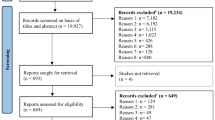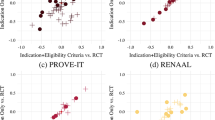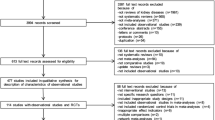Abstract
Background
Randomized controlled trials (RCTs) are regarded as high-level evidence, but the strength of their P values can be difficult to ascertain. The Fragility Index (FI) is a novel metric that evaluates the frailty of trial findings. It is defined as the minimum number of patients required to change from a non-event to event for the findings to lose statistical significance. This study aims to characterize the robustness of bariatric surgery RCTs by examining their FIs.
Methods
A search was conducted in MEDLINE, EMBASE, and CENTRAL from January 2000 to February 2022 for RCTs comparing two bariatric surgeries with statistically significant dichotomous outcomes. Bivariate correlation was conducted to identify associations between FI and trial characteristics.
Results
A total of 35 RCTs were included with a median sample size of 80 patients (Interquartile range [IQR] 58–109). The median FI was 2 (IQR 0–5), indicating that altering the status of two patients in one treatment arm would overturn the statistical significance of results. Subgroup analyses of RCTs evaluating diabetes-related outcomes produced a FI of 4 (IQR 2–6.5), while RCTs comparing Roux-en-Y gastric bypass and sleeve gastrectomy had an FI of 2 (IQR 0.5–5). Increasing FI was found to be correlated with decreasing P value, increasing sample size, increasing number of events, and increasing journal impact factor.
Conclusion
Bariatric surgery RCTs are fragile, with only a few patients required to change from non-events to events to reverse the statistical significance of most trials. Future research should examine the use of FI in trial design.
This is a preview of subscription content, access via your institution
Access options
Subscribe to this journal
Receive 12 print issues and online access
$259.00 per year
only $21.58 per issue
Buy this article
- Purchase on Springer Link
- Instant access to full article PDF
Prices may be subject to local taxes which are calculated during checkout


Similar content being viewed by others
References
Bondemark L, Ruf S. Randomized controlled trial: the gold standard or an unobtainable fallacy? Eur J Orthod. 2015;37:457–61.
Walsh M, Srinathan SK, McAuley DF, Mrkobrada M, Levine O, Ribic C, et al. The statistical significance of randomized controlled trial results is frequently fragile: a case for a Fragility Index. J Clin Epidemiol. 2014;67:622–8.
Chaitoff A, Zheutlin A, Niforatos JD. The Fragility Index and Trial Significance. JAMA Intern Med. 2020;180:1554–1554.
Lee Y, Doumouras AG, Yu J, Aditya I, Gmora S, Anvari M, et al. Laparoscopic sleeve gastrectomy versus laparoscopic roux-en-y gastric bypass: A systematic review and meta-analysis of weight loss, comorbidities, and biochemical outcomes from randomized controlled trials. Ann Surg. 2021;273:66–74.
Peterli R, Wolnerhanssen BK, Peters T, Vetter D, Kroll D, Borbely Y, et al. Effect of Laparoscopic Sleeve Gastrectomy vs Laparoscopic Roux-en-Y Gastric Bypass on Weight Loss in Patients With Morbid Obesity: The SM-BOSS Randomized Clinical Trial. JAMA. 2018;319:255–65.
Ruzbarsky JJ, Khormaee S, Daluiski A. The Fragility Index in Hand Surgery Randomized Controlled Trials. J Hand Surg Am. 2019;44:698.e1–7.
Forrester LA, McCormick KL, Bonsignore-Opp L, Tedesco LJ, Baranek ES, Jang ES, et al. Statistical Fragility of Surgical Clinical Trials in Orthopaedic Trauma. J Am Acad Orthop Surg Glob Res Rev. 2021;5. https://doi.org/10.5435/JAAOSGLOBAL-D-20-00197.
Pascoal E, Liu M, Lin L, Luketic L. The Fragility of Statistically Significant Results in Gynaecologic Surgery: A Systematic Review. J. Obstet Gynaecol Canada. 2021. https://doi.org/10.1016/J.JOGC.2021.11.016.
Chin B, Copeland A, Gallo L, Wakeham S, Coroneos CJ, Walsh M, et al. The Fragility of Statistically Significant Randomized Controlled Trials in Plastic Surgery. Plast Reconstr Surg. 2019;144:1238–45.
Guyatt GH, Oxman AD, Kunz R, Atkins D, Brozek J, Vist G, et al. GRADE guidelines: 2. Framing the question and deciding on important outcomes. J Clin Epidemiol. 2011;64:395–400.
Higgins JPT, Altman DG, Gøtzsche PC, Jüni P, Moher D, Oxman AD, et al. The Cochrane Collaboration’s tool for assessing risk of bias in randomised trials. BMJ. 2011;343. https://doi.org/10.1136/BMJ.D5928.
Morino M, Toppino M, Bonnet G, del Genio G, Tilanus HW, Johnson AG, et al. Laparoscopic Adjustable Silicone Gastric Banding Versus Vertical Banded Gastroplasty in Morbidly Obese Patients: A Prospective Randomized Controlled Clinical Trial. Ann Surg. 2003;238:835.
Lee WJ, Huang M, te, Yu PJ, Wang W, Chen TC. Laparoscopic vertical banded gastroplasty and laparoscopic gastric bypass: a comparison. Obes Surg. 2004;14:626–34.
Lee WJ, Yu PJ, Wang W, Chen TC, Wei PL, Huang MT. Laparoscopic Roux-en-Y Versus Mini-Gastric Bypass for the Treatment of Morbid Obesity: A Prospective Randomized Controlled Clinical Trial. Ann Surg. 2005;242:20.
Himpens J, Dapri G, Cadière GB. A Prospective Randomized Study Between Laparoscopic Gastric Banding and Laparoscopic Isolated Sleeve Gastrectomy: Results after 1 and 3 Years. Obes Surg. 2006;16:1450–6.
Scozzari G, Farinella E, Bonnet G, Toppino M, Morino M. Laparoscopic adjustable silicone gastric banding vs laparoscopic vertical banded gastroplasty in morbidly obese patients: Long-term results of a prospective randomized controlled clinical trial. Obes Surg. 2009;19:1108–15.
Lee WJ, Chong K, Ser KH, Lee YC, Chen SC, Chen JC, et al. Gastric Bypass vs Sleeve Gastrectomy for Type 2 Diabetes Mellitus: A Randomized Controlled Trial. Archiv Surg. 2011;146:143–8.
Søvik TT, Aasheim ET, Taha O, My Engström RN, Fagerland MW, Björkman S, et al. Weight loss, cardiovascular risk factors, and quality of life after gastric bypass and duodenal switch: A randomized trial. Ann Intern Med. 2011;155:281–91.
Lee WJ, Chen CY, Chong K, Lee YC, Chen SC, Lee SD. Changes in postprandial gut hormones after metabolic surgery: a comparison of gastric bypass and sleeve gastrectomy. Surg Obes Relat Dis. 2011;7:683–90.
Helmiö M, Victorzon M, Ovaska J, Leivonen M, Juuti A, Jaser N, et al. SLEEVEPASS: A randomized prospective multicenter study comparing laparoscopic sleeve gastrectomy and gastric bypass in the treatment of morbid obesity: Preliminary results. Surg Endosc. 2012;26:2521–6.
Søvik TT, Karlsson J, Aasheim ET, Fagerland MW, Björkman S, Engström M, et al. Gastrointestinal function and eating behavior after gastric bypass and duodenal switch. Surg Obes Relat Dis. 2013;9:641–7.
Darabi S, Talebpour M, Zeinoddini A, Heidari R. Laparoscopic gastric plication versus mini-gastric bypass surgery in the treatment of morbid obesity: A randomized clinical trial. Surg Obes Relat Dis. 2013;9:914–9.
Lee WJ, Chong K, Lin YH, Wei JH, Chen SC. Laparoscopic sleeve gastrectomy versus single anastomosis (mini-) gastric bypass for the treatment of type 2 diabetes mellitus: 5-Year results of a randomized trial and study of incretin effect. Obes Surg. 2014;24:1552–62.
Risstad H, Søvik TT, Engström M, Aasheim ET, Fagerland MW, Olsén MF, et al. Five-Year Outcomes After Laparoscopic Gastric Bypass and Laparoscopic Duodenal Switch in Patients With Body Mass Index of 50 to 60: A Randomized Clinical Trial. JAMA Surg. 2015;150:352–61.
Yi B, Jiang J, Zhu L, Li P, Im I, Zhu S. Comparison of the effects of Roux-en-Y gastrojejunostomy and LRYGB with small stomach pouch on type 2 diabetes mellitus in patients with BMI<35 kg/m2. Surg Obes Relat Dis. 2015;11:1061–8.
Grubnik VV, Ospanov OB, Namaeva KA, Medvedev OV, Kresyun MS. Randomized controlled trial comparing laparoscopic greater curvature plication versus laparoscopic sleeve gastrectomy. Surg Endosc. 2016;30:2186–91.
Seetharamaiah S, Tantia O, Goyal G, Chaudhuri T, Khanna S, Singh JP, et al. LSG vs OAGB—1 Year Follow-up Data—a Randomized Control Trial. Obes Surg. 2017;27:948–54.
Ignat M, Vix M, Imad I, D’Urso A, Perretta S, Marescaux J, et al. Randomized trial of Roux-en-Y gastric bypass versus sleeve gastrectomy in achieving excess weight loss. BrJ Surg. 2017;104:248–56.
Peterli R, Wölnerhanssen BK, Vetter D, Nett P, Gass M, Borbély Y, et al. Laparoscopic Sleeve Gastrectomy Versus Roux-Y-Gastric Bypass for Morbid Obesity—3-Year Outcomes of the Prospective Randomized Swiss Multicenter Bypass Or Sleeve Study (SM-BOSS). Ann Surg. 2017;265:466.
Nguyen NT, Kim E, Vu S, Phelan M. Ten-year Outcomes of a Prospective Randomized Trial of Laparoscopic Gastric Bypass Versus Laparoscopic Gastric Banding. Ann Surg. 2018;268:106–13.
Talebpour M, Sadid D, Talebpour A, Sharifi A, Davari FV. Comparison of Short-Term Effectiveness and Postoperative Complications: Laparoscopic Gastric Plication vs Laparoscopic Sleeve Gastrectomy. Obes Surg. 2018;28:996–1001.
Salminen P, Helmio M, Ovaska J, Juuti A, Leivonen M, Peromaa-Haavisto P, et al. Effect of Laparoscopic Sleeve Gastrectomy vs Laparoscopic Roux-en-Y Gastric Bypass on Weight Loss at 5 Years Among Patients With Morbid Obesity: The SLEEVEPASS Randomized Clinical Trial. JAMA. 2018;319:241–54.
Capristo E, Panunzi S, de Gaetano A, Spuntarelli V, Bellantone R, Giustacchini P, et al. Incidence of Hypoglycemia After Gastric Bypass vs Sleeve Gastrectomy: A Randomized Trial. J Clin Endocrinol Metab. 2018;103:2136–46.
Robert M, Espalieu P, Pelascini E, Caiazzo R, Sterkers A, Khamphommala L, et al. Efficacy and safety of one anastomosis gastric bypass versus Roux-en-Y gastric bypass for obesity (YOMEGA): a multicentre, randomised, open-label, non-inferiority trial. The Lancet. 2019;393:1299–309.
Hofsø D, Fatima F, Borgeraas H, Birkeland KI, Gulseth HL, Hertel JK, et al. Gastric bypass versus sleeve gastrectomy in patients with type 2 diabetes (Oseberg): a single-centre, triple-blind, randomised controlled trial. Lancet Diabetes Endocrinol. 2019;7:912–24.
Jain M, Tantia O, Goyal G, Chaudhuri T, Khanna S, Poddar A, et al. LSG vs MGB-OAGB: 5-Year Follow-up Data and Comparative Outcome of the Two Procedures over Long Term—Results of a Randomised Control Trial. Obes Surg. 2021;31:1223–32.
Wallenius V, Alaraj A, Björnfot N, Orrenius B, Kylebäck A, Björklund P, et al. Sleeve gastrectomy and Roux-en-Y gastric bypass in the treatment of type 2 diabetes. Two-year results from a Swedish multicenter randomized controlled trial. Surg Obes Relat Dis. 2020;16:1035–44.
Pajecki D, Dantas ACB, Kanaji AL, de Oliveira DRCF, de Cleva R, Santo MA. Bariatric surgery in the elderly: a randomized prospective study comparing safety of sleeve gastrectomy and Roux-en-Y gastric bypass (BASE Trial). Surg Obes Relat Dis. 2020;16:1436–40.
Barros F, Fonseca ABM Bariatric surgery during the evolution of fatty liver-A randomized clinical trial comparing gastric bypass and sleeve gastrectomy based on transient elastography. Clin Obes. 2020;10. https://doi.org/10.1111/COB.12393.
Roushdy A, Abdel-Razik MA, Emile SH, Farid M, Elbanna HG, Khafagy W, et al. Fasting ghrelin and postprandial GLP-1 levels in patients with morbid obesity and medical comorbidities after sleeve gastrectomy and one-anastomosis gastric bypass: A randomized clinical trial. Surg Laparosc Endosc Percutan Tech. 2021;31:28–35.
Hofsø D, Hillestad TOW, Halvorsen E, Fatima F, Johnson LK, Lindberg M, et al. Bone Mineral Density and Turnover After Sleeve Gastrectomy and Gastric Bypass: A Randomized Controlled Trial (Oseberg). J Clin Endocrinol Metab. 2021;106:501.
Musella M, Vitiello A, Berardi G, Velotti N, Pesce M, Sarnelli G. Evaluation of reflux following sleeve gastrectomy and one anastomosis gastric bypass: 1-year results from a randomized open-label controlled trial. Surg Endosc. 2021;35:6777–85.
Lorentzen J, Medhus AW, Hofsø D, Svanevik M, Seip B, Hjelmesæth J. Sleeve Gastrectomy Confers Higher Risk of Gastroesophageal Reflux Disease Than Gastric Bypass: A Randomized Controlled Trial From the Oseberg Reflux Working Group. Gastroenterology. 2021;161:2044–6.e4.
Grönroos S, Helmiö M, Juuti A, Tiusanen R, Hurme S, Löyttyniemi E, et al. Effect of Laparoscopic Sleeve Gastrectomy vs Roux-en-Y Gastric Bypass on Weight Loss and Quality of Life at 7 Years in Patients With Morbid Obesity: The SLEEVEPASS Randomized Clinical Trial. JAMA Surg. 2021;156:137–46.
Fatima F, Hjelmesæth J, Birkeland KI, Gulseth HL, Hertel JK, Svanevik M, et al. Gastrointestinal Hormones and β-Cell Function After Gastric Bypass and Sleeve Gastrectomy: A Randomized Controlled Trial (Oseberg). J Clin Endocrinol Metab. 2022;107:e756–66.
Grolleau F, Collins GS, Smarandache A, Pirracchio R, Gakuba C, Boutron I, et al. The Fragility and Reliability of Conclusions of Anesthesia and Critical Care Randomized Trials With Statistically Significant Findings: A Systematic Review. Crit Care Med. 2019;47:456–62.
Mazzinari G, Ball L, Serpa Neto A, Errando CL, Dondorp AM, Bos LD, et al. The fragility of statistically significant findings in randomised controlled anaesthesiology trials: systematic review of the medical literature. Br J Anaesth. 2018;120:935–41.
Khan M, Evaniew N, Gichuru M, Habib A, Ayeni OR, Bedi A, et al. The Fragility of Statistically Significant Findings from Randomized Trials in Sports Surgery: A Systematic Survey. Am J Sports Med. 2017;45:2164–70.
Muthu S, Ramakrishnan E. Fragility Analysis of Statistically Significant Outcomes of Randomized Control Trials in. Spine Surg Spine. 2021;46:198–208.
Condon TM, Sexton RW, Wells AJ, To MS. The weakness of fragility index exposed in an analysis of the traumatic brain injury management guidelines: A meta-epidemiological and simulation study. PLoS ONE. 2020;15:e0237879.
Shochet LR, Kerr PG, Polkinghorne KR. The fragility of significant results underscores the need of larger randomized controlled trials in nephrology. Kidney Int. 2017;92:1469–75.
Tignanelli CJ, Napolitano LM. The Fragility Index in Randomized Clinical Trials as a Means of Optimizing Patient Care. JAMA Surg. 2019;154:74–79.
Campbell RT, Jhund PS, Petrie MC, McMurray JJV. How robust are clinical trials in heart failure? Eur Heart J. 2017;38:338–45.
Ridgeon EE, Young PJ, Bellomo R, Mucchetti M, Lembo R, Landoni G. The Fragility Index in Multicenter Randomized Controlled Critical Care Trials. Crit Care Med. 2016;44:1278–84.
Carter RE, McKie PM, Storlie CB. The Fragility Index: a P-value in sheep’s clothing? Eur Heart J. 2017;38:346–8.
Padwal R, Klarenbach S, Wiebe N, Birch D, Karmali S, Manns B, et al. Bariatric surgery: a systematic review and network meta-analysis of randomized trials. Obes Rev. 2011;12:602–21.
Schröder A, Muensterer OJ, Oetzmann von Sochaczewski C. Meta-analyses in paediatric surgery are often fragile: implications and consequences. Pediatr Surg Int. 2021;37:363–7.
Evaniew N, Files C, Smith C, Bhandari M, Ghert M, Walsh M, et al. The fragility of statistically significant findings from randomized trials in spine surgery: a systematic survey. Spine J. 2015;15:2188–97.
Noel CW, McMullen C, Yao C, Monteiro E, Goldstein DP, Eskander A, et al. The fragility of statistically significant findings from randomized trials in head and neck surgery. Laryngoscope. 2018;128:2094–2100.
Goerke K, Parke M, Horn J, Meyer C, Dormire K, White B, et al. Are results from randomized trials in anesthesiology robust or fragile? An analysis using the fragility index. Int J Evid Based Healthc. 2020;18:116–24.
Robinson T, Al-Shahwani N, Easterbrook B, VanHouwelingen L. The fragility of statistically significant findings from randomized controlled trials in pediatric appendicitis: A systematic review. J Pediatr Surg. 2020;55:800–4.
Gaudino M, Hameed I, Biondi-Zoccai G, Tam DY, Gerry S, Rahouma M, et al. Systematic Evaluation of the Robustness of the Evidence Supporting Current Guidelines on Myocardial Revascularization Using the Fragility Index. Circ Cardiovasc Qual Outcomes. 2019;12. https://doi.org/10.1161/CIRCOUTCOMES.119.006017.
Checketts JX, Scott JT, Meyer C, Horn J, Jones J, Vassar M. The Robustness of Trials That Guide Evidence-Based Orthopaedic Surgery. J Bone Joint Surg Am. 2018;100:E85.
Parisien RL, Danford NC, Jarin IJ, Li X, Trofa DP, Vosseller JT. The Fragility of Statistical Findings in Achilles Tendon Injury Research: A Systematic Review. JAAOS Global Res Rev. 2021;5. https://doi.org/10.5435/JAAOSGLOBAL-D-21-00018.
Andrade C. The P Value and Statistical Significance: Misunderstandings, Explanations, Challenges, and Alternatives. Indian J Psychol Med. 2019;41:210–5.
Yaddanapudi L. The American Statistical Association statement on P-values explained. J Anaesthesiol Clin Pharmacol. 2016;32:421.
McCormick KL, Tedesco LJ, Swindell HW, Forrester LA, Jobin CM, Levine WN. Statistical fragility of randomized clinical trials in shoulder arthroplasty. J Shoulder Elbow Surg. 2021;30:1787–93.
Ahmed W, Fowler RA, McCredie VA. Does Sample Size Matter When Interpreting the Fragility Index? Crit Care Med. 2016;44:e1142–3.
Andrade C. The use and limitations of the fragility index in the interpretation of clinical trial findings. J Clin Psych. 2020;81. https://doi.org/10.4088/JCP.20f13334.
Bomze D, Meirson T. A critique of the fragility index. Lancet Oncol. 2019;20:e551.
Author information
Authors and Affiliations
Contributions
YL was essential in the design of the study, and interpretation of data. He was also active in the writing, editing, gave final approval of the paper, and resolved discrepancies during article screening. YS was involved in the study design, data acquisition, risk of bias assessment and data analysis of the study. He also participated in the drafting and revising of the paper and gave final approval of the paper. LC was involved in the acquisition of data, risk of bias assessment, writing and revision of the paper and gave final approval of the text. AH was involved in the acquisition of data, writing and revision of the paper and gave final approval of the text. AJ was paramount in the data analysis, writing, and editing of the paper and gave final approval of the text. TM gave substantial input for the conception of the study, interpretation of data, revision of the paper, and gave final approval of the text. AD gave substantial input for the conception of the study, interpretation of data, revision of the paper, and gave final approval of the text. DH greatly facilitated the conception and design of the study, provided essential revisions and suggestions for the paper, and gave final approval of the text.
Corresponding author
Ethics declarations
Competing interests
The authors declare no competing interests.
Additional information
Publisher’s note Springer Nature remains neutral with regard to jurisdictional claims in published maps and institutional affiliations.
Supplementary information
Rights and permissions
Springer Nature or its licensor (e.g. a society or other partner) holds exclusive rights to this article under a publishing agreement with the author(s) or other rightsholder(s); author self-archiving of the accepted manuscript version of this article is solely governed by the terms of such publishing agreement and applicable law.
About this article
Cite this article
Lee, Y., Samarasinghe, Y., Chen, L.H. et al. Fragility of statistically significant outcomes in randomized trials comparing bariatric surgeries. Int J Obes 47, 546–553 (2023). https://doi.org/10.1038/s41366-023-01298-1
Received:
Revised:
Accepted:
Published:
Issue Date:
DOI: https://doi.org/10.1038/s41366-023-01298-1



